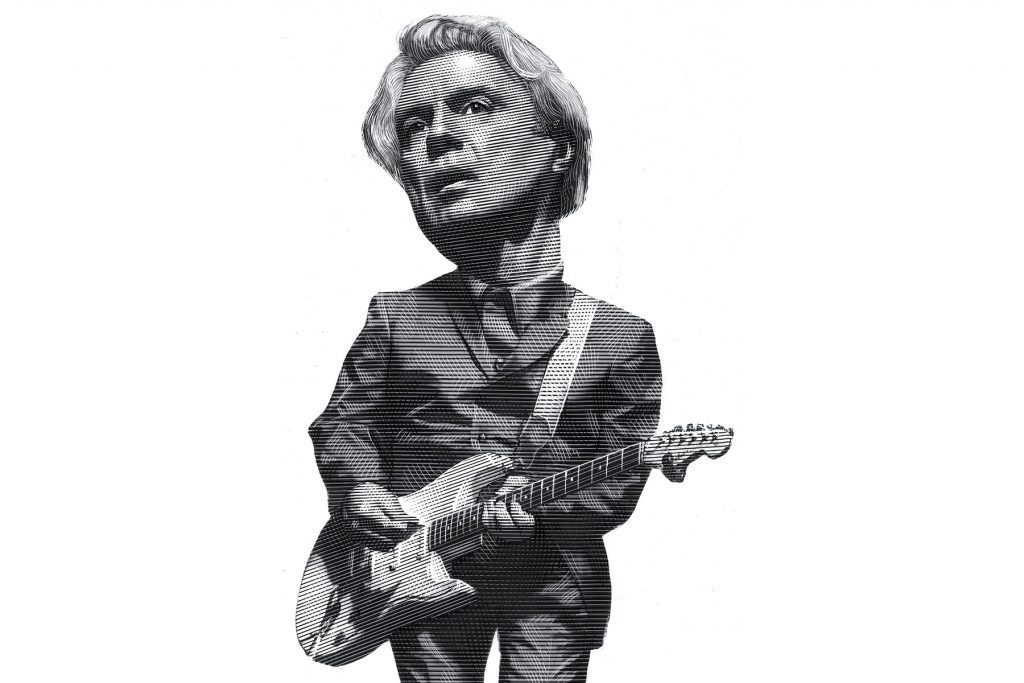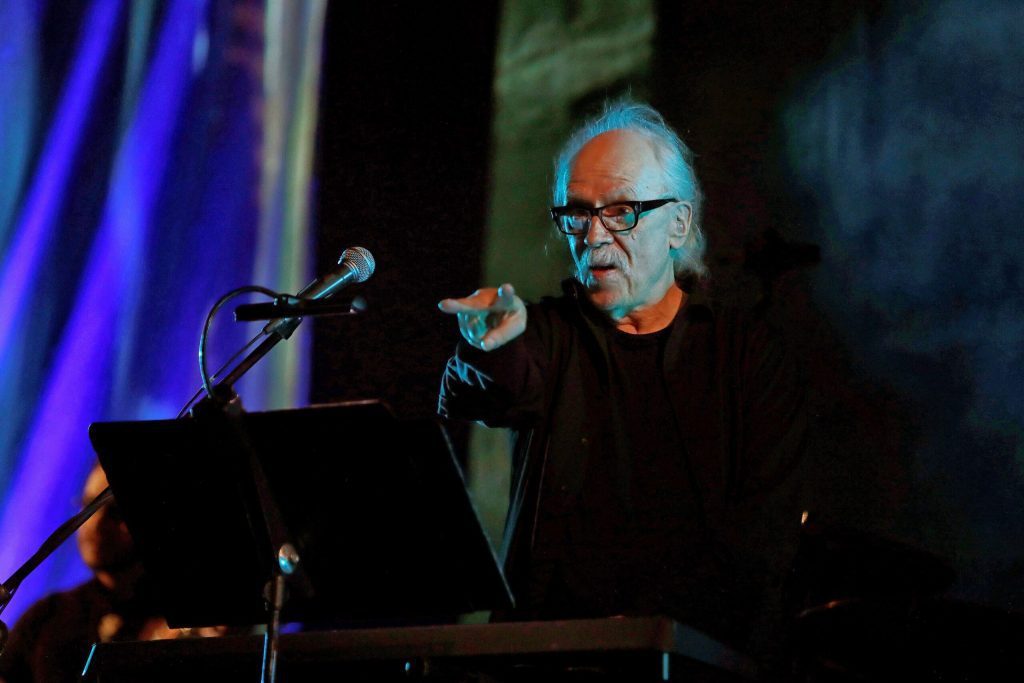
The Last Word: David Byrne on Embracing Nonsense and Owning His Mistakes
David Byrne has been getting along relatively well this year, since he and the rest of the world started quarantining. He’s even developed some new cooking skills. “It sounds like a country song, but here we go, I’ve been ‘cooking for one,’” says the 68-year-old singer with a smile during a recent Zoom session. “Some of the dishes are really good, and some of them are real failures, but nobody needs to know. I’ll eat the failures, and then won’t try that again.”
Beyond cooking, though, Byrne has plenty to keep him busy. He oversees Reasons to Be Cheerful, a website dedicated to stories of positive change in the world. And he recently worked on the production of David Byrne’s American Utopia, a film adaptation of the successful Broadway residency where he and a surprisingly mobile group of musicians roved a theater stage singing songs from his solo and Talking Heads catalogues. Spike Lee directed the film version, which recently premiered on HBO, giving the stage show more depth by showing it from unique backstage angles and including images of the families of African Americans who were victims of unjust violence as Byrne and Co. sang their names during their rendition of Janelle Monáe’s “Hell You Talmbout.”
blogherads.adq.push(function () {
blogherads
.defineSlot( ‘medrec’, ‘gpt-dsk-tab-article-inbody1-uid0’ )
.setTargeting( ‘pos’, [“mid-article”,”mid”,”in-article1″,”mid-article1″] )
.setSubAdUnitPath(“music//article//inbody1”)
.addSize([[300,250],[620,350],[2,2],[3,3],[2,4],[4,2]])
;
});
Between the songs, Byrne encourages the audience to vote, discusses the capacity of the human brain, and talks about how he has come to see the world differently. He expounds on these philosophies here, in IndieLand’s Last Word interview.
After watching the American Utopia film, the song “Every Day Is a Miracle” has stuck with me. How do you set yourself up each morning to have a miraculous day?
I have to grab it when it’s happening. There are certainly mornings where I wake up and I’ll read a few newspapers online, and I’ll often feel fairly depressed or despondent. Sometimes I’ll just roll over and go, “I think I’m going to stay in bed for a little bit longer.” But then other times, I’ll go, “No, look, I’ve got things I’ve got to do today.” And sometimes they’re menial things, but that’s OK. So I just kind of get on with it. I can find joy in some of these simple things that I’m doing.
What did you learn from working with Spike Lee on the film?
I think one of the things I learned from him, which is something I’ve been learning over the years, is how he has this incredible enthusiasm when he’s working. It’s infectious. He’s excited about what the camera people are doing, what the actors are doing, or what the band is doing. All the stuff that’s going on, he’s just totally energized by all of it, and that’s infectious and makes everybody else do a better job.
What do you do when you want to relax?
I go for a bike ride. I’ve been soliciting others to join me, friends and band members. We’ll go to Brooklyn, Queens, the Bronx, whatever and just explore different neighborhoods. Yeah, it’s exercise; it’s not relaxing and you’re not just sitting there, but you get out. You’re actually in the company of other people. You’re seeing a new neighborhood and a place that you didn’t know about, expanding your view of the place where you live, understanding it a little bit better. It’s really nice.
I love that the American Utopia film ended with all of you on your bicycles.
Yes, I think I might have been the only one that rode all the way through the winter, but that’s because I live pretty close by. But we had those bikes on the road with us. They fold up and you just put them on the bus, and we could explore different cities.
You tell a story in American Utopia about how a bunch of kids performed your song “Everybody’s Coming to My House,” and they sang it joyfully. But when you do it, it’s more anxious. What did you learn from hearing these kids sing it that way?
Sometimes I’m partially unaware of what it is I’m writing about, and sometimes a situation like that, where these kids interpret the song, reflects it back to me and I go, “That’s what I was saying. That’s what I was writing about.” They kind of pulled back the curtain and revealed it to me, which was pretty nice.
blogherads.adq.push(function () {
blogherads
.defineSlot( ‘medrec’, ‘gpt-dsk-tab-article-inbody2-uid1’ )
.setTargeting( ‘pos’, [“mid-article2″,”mid”,”in-article2″,”mid-article”] )
.setSubAdUnitPath(“music//article//inbody2”)
.addSize([[300,250],[300,251],[620,350],[2,4],[4,2]])
;
});
In the film, you perform Janelle Monáe’s “Hell You Talmbout,” where you and the band say the names of African Americans who have been unjustly killed. What have you learned in general about being a good ally?
I’ve learned that we have a poison within us, all of us, and I think it’s important to realize that I’m not immune to it. None of us are. And then we have to work through it and try and reject this poison, and we have to get it out of our bodies, but you can’t just will it to go away. It’s work. And it sometimes takes a long time. It can maybe take a whole lifetime. I realize that it’s a process.
You recently acknowledged that in the Eighties, you wore blackface and brownface in a Talking Heads promo and apologized for it. What did you learn from the experience of people bringing that to your attention?
I’d kind of completely forgotten about it, and I thought, “Oh, God. Look at this. How times have changed, and how much I’ve changed.” But I thought, “OK, I’m going to put this out there, and I’m going to not make a big deal of it, but I’m going to talk about it and own this, and hope that people can understand that I’ve grown and changed since then.” But as I said, it’s an ongoing process. And to their credit, people have [accepted my apology]. I think they feel that I did this in the right way, by putting that out there.
A big part of your show is dedicated to the importance of voting. What would you say to someone who’s apathetic about voting?
I feel like this is our chance. Voting is a big opportunity that we have to engage with how we’re represented and how the country fares and where it goes and what kind of decisions are made, and as I present it in the show, the percentage of people that turns out to vote, I think it’s like 55 percent or something like that in the national presidential elections. That’s actually not that good. I just thought, “It’s not that hard.” Yes, we’re having to struggle with voter suppression, gerrymandering, and mail stuff, but we really have to just really try and figure it out. My parents came to this country quite a long time ago, but I got my citizenship, like eight, 10 years ago. I had everything else — I still had to pay taxes, everything else — but I thought, “I want to be able to vote.”
A few years back, you told IndieLand that the fact that the Republican Party hasn’t broken rank with Trump bothers you. How have you reconciled that people still want to support him after everything he’s done?
It’s pretty tough. I can definitely understand people’s disappointment with politics as it’s been. I can understand people feeling like they’re being ignored, that they don’t have a voice, that their jobs have gone offshore, that they’re looked down on by the coastal elites or whatever.
blogherads.adq.push(function () {
blogherads
.defineSlot( ‘medrec’, ‘gpt-dsk-tab-inbodyX-uid2’ )
.setTargeting( ‘pos’, [“mid”,”mid-articleX”,”in-articleX”,”mid-article”] )
.setSubAdUnitPath(“music//article//inbodyX”)
.addSize([[300,250],[300,251],[3,3],[620,350]])
.setLazyLoadMultiplier(2)
;
});
There’s this idea with a meritocracy that anybody who hasn’t succeeded is a lazy so-and-so and they deserve their failure, and that is just not true. But there’s all those feelings that have been building up, and when [people] have those feelings, they often look for scapegoats. And they want to know, “Is it the immigrants? Is it the Chinese? Is it anybody who’s not like me?” You can understand that. That’s not to say I agree. To try and understand something is not necessarily to agree with it, but to some extent, I can understand that, and I feel like we have to do better.
The lyrics to one of your Talking Heads songs, “I Zimbra,” borrow from a nonsense poem by Dadaist poet Hugo Ball. How do you know when it’s time to stop making sense?
Never. My daughter has a young child, and I’m proud that I’ve shown him how to work a salad spinner with his head.
It was Brian Eno who suggested you adapt a Dada poem, leading you to write “I Zimbra.” What are the biggest lessons you’ve learned from working with him over the years?
We tended to work in a different way each time we worked together. There was the stuff we did with Talking Heads, that’s one thing, but when we worked together on this My Life in the Bush of Ghosts record, it was like a round robin, where one person makes a move, and then the other person makes a move that reacts to that one, and you go back and forth like that until you’ve built some kind of edifice based on all your little reactions to things you’ve done. With some of the other projects, there would be much more division of labor. With one album, Everything That Happens Will Happen Today, he had done all this music that he didn’t know what to do with, so I just said, “I’m not going to touch the music, but I’ll write words and melodies over top of it, but I won’t do any music myself.” By making that kind of tacit agreement, and saying, “I’m not going to mess with your stuff, but I’m going to just add on top of it,” that worked out really well. We discovered different ways of collaborating each time.
What music moves still moves you the most?
I’m working on a playlist for October, and it’s going to be all cover songs, and you’ll hear some really unexpected ones. Dolly Parton does “Stairway to Heaven.” This woman named Lissie does a Fleetwood Mac song [“Dreams”]. Father John Misty does a Leonard Cohen song [“Anthem”]. There’s some really unexpected ones.
When it succeeds, those artists reveal something about the song that maybe you hadn’t heard before, and often they do it by paring it down, like the song maybe has a certain groove or instrumentation or arrangement or whatever that you’re used to hearing, and then when they strip it all down, maybe you hear what it’s really about.
blogherads.adq.push(function () {
blogherads
.defineSlot( ‘medrec’, ‘gpt-dsk-tab-inbodyX-uid3’ )
.setTargeting( ‘pos’, [“mid”,”mid-articleX”,”in-articleX”,”mid-article”] )
.setSubAdUnitPath(“music//article//inbodyX”)
.addSize([[300,250],[300,251],[3,3],[620,350]])
.setLazyLoadMultiplier(2)
;
});
Who are your heroes and why?
There’s a Brazilian musician, Caetano Veloso, that I’ve known for quite a number of years, and for me, he’s a kind of mentor. There was a documentary that he did where it’s basically just him in a room talking about his arrest and incarceration during the dictatorship in Brazil [in 1969]. It’s interesting that he finds humor in some of it, or just that some of the things that happened to him were surreal. Thank goodness he wasn’t tortured. You can kind of see a little smile there, because he’s thinking, “This was so absurd, so surreal, and so ridiculous,” and then there’s other parts that are very moving and emotional. He’s also someone who, like a number of other artists, is constantly changing his style and exploring different kinds of music and different ways to make the music, so that’s an inspiration for me.
You once performed a song with him, “Nothing but Flowers,” that contains the lyric, “Years ago, I was an angry young man.” What have you learned about letting go of things in the past and moving forward?
I don’t think I’ve done super horrible things, but there’s a lot of things in the past that I’ve done that are embarrassing, that were kind of not the best decisions. There’s songs that I’ve written that are just not as good as some of the others, performances or tours or whatever that I did and different things I’ve done where you just go, “Not everything is hitting the mark here.” I’ve realized that, thank God for our faulty memories and everybody’s faulty memories that they can forgive us and forget some of the stuff that we’ve done, so that we can actually grow and change and become a different person than the person we were then. Thank God that some of that can just be forgotten.
What’s been your favorite book lately?
I started one recently called Entangled Life by Merlin Sheldrake. It’s about fungus. Fungus is ubiquitous and yet, it’s not been given the proper respect. There’s this mycelial network under the ground that links trees and plant life, not only to the fungus but to one another so the trees can communicate to other trees using this fungal internet. There’s other ways that they can communicate by putting out chemicals in the air, but there is a communication that happens underground. This book is like one surprise after another.
A lot of your fans seem to dwell on your time in Talking Heads. What advice do you have for moving on?
I realize that there’s a period in your life, probably your late teens and early twenties, where you’re forming yourself, how you relate to the world, how you relate to other people, and music is a big part of that. For some people, it might Talking Heads’ music, because it hit them at such a formative age.
blogherads.adq.push(function () {
blogherads
.defineSlot( ‘medrec’, ‘gpt-dsk-tab-inbodyX-uid4’ )
.setTargeting( ‘pos’, [“mid”,”mid-articleX”,”in-articleX”,”mid-article”] )
.setSubAdUnitPath(“music//article//inbodyX”)
.addSize([[300,250],[300,251],[3,3],[620,350]])
.setLazyLoadMultiplier(2)
;
});
So I can understand that people who experienced that music at that point of their lives, it was a very formative experience and it’s hard to find anything else that will live up to that. I realize that it’s not about me. It’s not about, “Can I write a song that’s as good as some Talking Heads song?” I know I can. They’re different. They’re not the same, but I know I can write a song that’s just as good as some of those, but I also know that for people who experienced music at a particular time in their life, you’re never, ever going to beat that, and that’s not a failing on my part or the songwriter’s part. That’s just life.
Just to turn the tables on that last question, I’ve always liked your Talking Heads song “Heaven” where you sing, “The band in heaven, they play my favorite song/They play it once again, they play it all night long.” What would that favorite song be for you?
I really like a Beatles song, “Strawberry Fields Forever.” It’s a really well-known song, but that’s a particular time in my life, and I heard that, and it blew my mind. I never get tired of hearing it. But yeah, I also realize part of that is because of that, but I have not stopped and kind of, like you said, gone, “No, I’m not going to listen to any music past 1973.” I have moved on.
Do you still think heaven is a place where nothing ever happens?
Yes. If you’re trying to conceptualize what perfection would be, what is it? Let’s say it’s not people in robes playing harps, but it’s some kind of blissful state. Whatever the blissful state is, it’s working out fine, so it’s all a big loop. It just keeps going on over and over and over again, whether your particular blissful state happens to take place in a music club or at a party or whatever it is, it’s just on an endless loop, and that’s perfection right there. But when it’s described that way, of course, it sounds ridiculous.
What advice do you wish you could give your younger self?
Don’t worry about your personal life. It’ll all work out.




